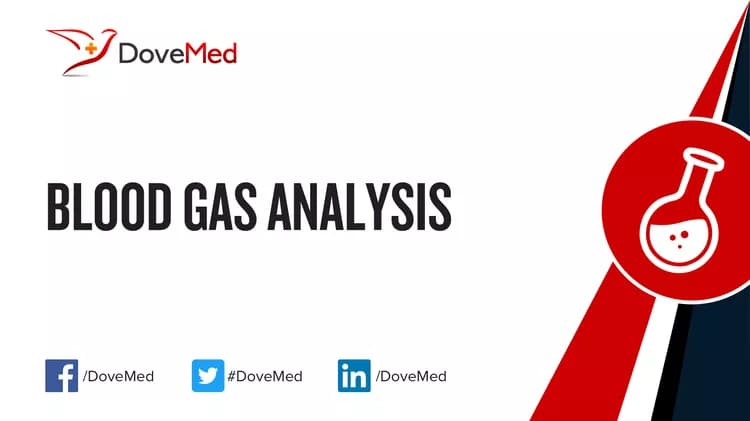What are the other Names for this Test? (Equivalent Terms)
- Capillary Blood Gases Blood Test
- Cord Blood Gases Blood Test
- Venous Blood Gases Blood Test
What is Blood Gas Analysis Test? (Background Information)
The dominant “gases” in blood are oxygen and carbon dioxide. They are present in various forms. The partial pressure (Px) of these gases varies with acid-base balance and with the functioning of the lung (respiratory), kidney (renal), and heart (cardiovascular) system.
The Blood Gas Analysis is made up of the following individual tests:
- pH - measures the acidity or alkalinity of blood. Acids, such as carbon dioxide decrease pH, while bases, such as bicarbonate increase pH
- Poxygen - measures the levels of oxygen in blood
- Pcarbon dioxide - measures the levels of carbon dioxide in blood
- Pbicarbonate - measures the levels of bicarbonate in blood
- Oxygen saturation - measures the percentage of hemoglobin that is carrying oxygen. Hemoglobin (Hb) is the predominant protein in red blood cells. It is responsible for transporting oxygen
- Base excess (BE) or base deficit (BD) - measures the amount of total bases in blood that are available for protecting it against extreme changes in pH. This protection is called buffering. Buffering bases include bicarbonate, phosphates, hemoglobin, and other proteins
What are the Clinical Indications for performing the Blood Gas Analysis Test?
Following are the clinical indications for performing a Blood Gas Analysis:
- Performing a routine blood screen
- Difficulty breathing, wheezing
- Diarrhea
- Vomiting
- Fever
- Panic attacks
- Anemia
How is the Specimen Collected for Blood Gas Analysis Test?
Following is the specimen collection process for Blood Gas Analysis:
Sample required: Blood
Process: Insertion of a needle into an arm vein.
Preparation required: No special preparation is needed prior to the test.
What is the Significance of the Blood Gas Analysis Test Result?
The significance of Blood Gas Analysis is explained:
Decreased pH levels may indicate:
- Addison’s disease
- Diabetic ketoacidosis
- High-fat/low-carbohydrate diet
- Hypercalcemia
- Fanconi’s syndrome
- Cystinosis
- Wilson’s disease
- Diarrhea
- Hyperkalemia
- Fistula
- Kidney disease
- Asthma
- Bronchoconstriction
- Emphysema
- Pneumonia
- Pulmonary edema
Increased Poxygen levels may indicate:
- Hyperbaric oxygenation
- Hyperventilation
Decreased Poxygen levels may indicate:
- Cancer
- Compression or resection of lung
- Respiratory distress syndrome (RDS) in newborns
- Sarcoidosis
- Asthma
- Bronchitis
- Bronchiectasis
- Croup
- Cystic fibrosis
- Emphysema
- Granulomata
- Pneumonia
- Pulmonary infarction
- Shock
Increased Pcarbon dioxide levels may indicate:
- Acute intermittent porphyria
- Asthma
- Bronchitis
- Congestive heart failure
- Cystic fibrosis
- Emphysema
- Near drowning
- Pneumothorax
- Pulmonary edema
- Tumor
Decreased Pcarbon dioxide levels may indicate:
- Anxiety
- Pneumonia
- Pulmonary embolism
- Sarcoidosis
- Pneumothorax
Increased Pbicarbonate levels may indicate:
- Anoxia
- Metabolic alkalosis
- Respiratory alkalosis
Decreased Pbicarbonate levels may indicate:
- Hypocapnia
- Metabolic acidosis
- Respiratory acidosis
Increased oxygen saturation may indicate:
- Anorexia nervosa
- Anoxia
- Atelectasis
- Carbon monoxide poisoning
- Congenital heart defects
- Fever
- Pleural effusion
An increased base excess (BE) may indicate metabolic alkalosis, while a decreased BE may indicate metabolic acidosis.
The laboratory test results are NOT to be interpreted as results of a "stand-alone" test. The test results have to be interpreted after correlating with suitable clinical findings and additional supplemental tests/information. Your healthcare providers will explain the meaning of your tests results, based on the overall clinical scenario.
Additional and Relevant Useful Information:
- Unlike most other blood tests, the Blood Gases Test uses blood from an artery, instead of from a vein. This is because most veins carry blood with low oxygen content
Certain medications that you may be currently taking may influence the outcome of the test. Hence, it is important to inform your healthcare provider, the complete list of medications (including any herbal supplements) you are currently taking. This will help the healthcare provider interpret your test results more accurately and avoid unnecessary chances of a misdiagnosis.
Related Articles
Test Your Knowledge
Asked by users
Related Centers
Related Specialties
Related Physicians
Related Procedures
Related Resources
Join DoveHubs
and connect with fellow professionals


0 Comments
Please log in to post a comment.